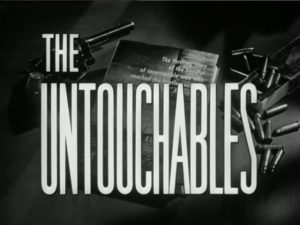The Four Media "Untouchables"
A few years ago, I provided media training to an executive who worked for a private water company that provided water to a few hundred thousand local residents.
One of their customers hadn’t paid his bills for three years. They sent him dozens of past due notices and numerous letters trying to make him aware of a program they had for low-income residents. He refused to respond. But he kept using their water.
Normally, they would have cut off his service after a few months. But they kept it on for one reason: the man was paralyzed and in a wheelchair. After so many attempts to speak to him, they finally decided enough was enough. Paralyzed or not, he was using a service that cost money to provide, and he wasn’t willing to communicate at all with the company.
The water company decided to cut his water. And the executive wanted my advice on the best way to handle any negative press that resulted from their decision.
The advice I offered wasn’t what he wanted to hear. “Keep the water on,” I said.
Here’s why: The media would inevitably cover this as a David vs. Goliath story – the big, bad water company versus the poor, disabled man. The visuals in the television story would show the exterior of the water company headquarters building and a well-dressed corporate spokesperson, butted up against the man’s modest home and his aged wheelchair.
Worse, the media could have easily said something like this:
“The water company says it had no choice but to turn off Mr. Tucker’s water since he owes them $4,300. But that’s a drop in the bucket for the company. Last year, CEO John Smith made more than $1.2 million in salary and stock options.”
To make the inevitable P.R. headache that their decision caused go away, the company would probably end up reversing its decision and restoring the man’s water anyway. Plus, they would have tipped their hat to every other disabled resident in the community that they, too, could stop paying their bills and get away with it. Instead, the right decision was simple. Keep the water on.
I thought of that story when I came across an excellent post by Jodie Heisner, president of Arizona-based Bottomline Media Coaching. In her piece, she argues that:
“When it comes to public opinion there are four groups that I consider untouchables, that is if you do or are accused of doing anything wrong to a member of one of these groups you are pretty much up the creek without a paddle. The groups are: small children, elderly, animals and the disabled.”
She’s right. And to help make her point, Jodie shared this clip from a local news station about the abusive behavior of one company toward a woman with cerebral palsy:
So tread carefully with those four groups. They’re usually portrayed by the media as the story’s David – which means that you’ll be portrayed as the big, unfeeling, awful Goliath.
Click here to read a follow-up post about this topic, based on a couple of reader comments.
*Note: I changed the example at the beginning of this post slightly to protect the client’s confidentiality.
Have the best of the blog delivered to your inbox twice per month! Enter your name in the box below to join our mailing list.




This is a really good post. It seems the best you could hope for in the water company example is for things to be neutral. In some cases, it may be worth making that decision as long as the company is willing to defend its position. Too many times they make the decision and then disappear.
How about quietly putting a lien on the property? Would that fly?